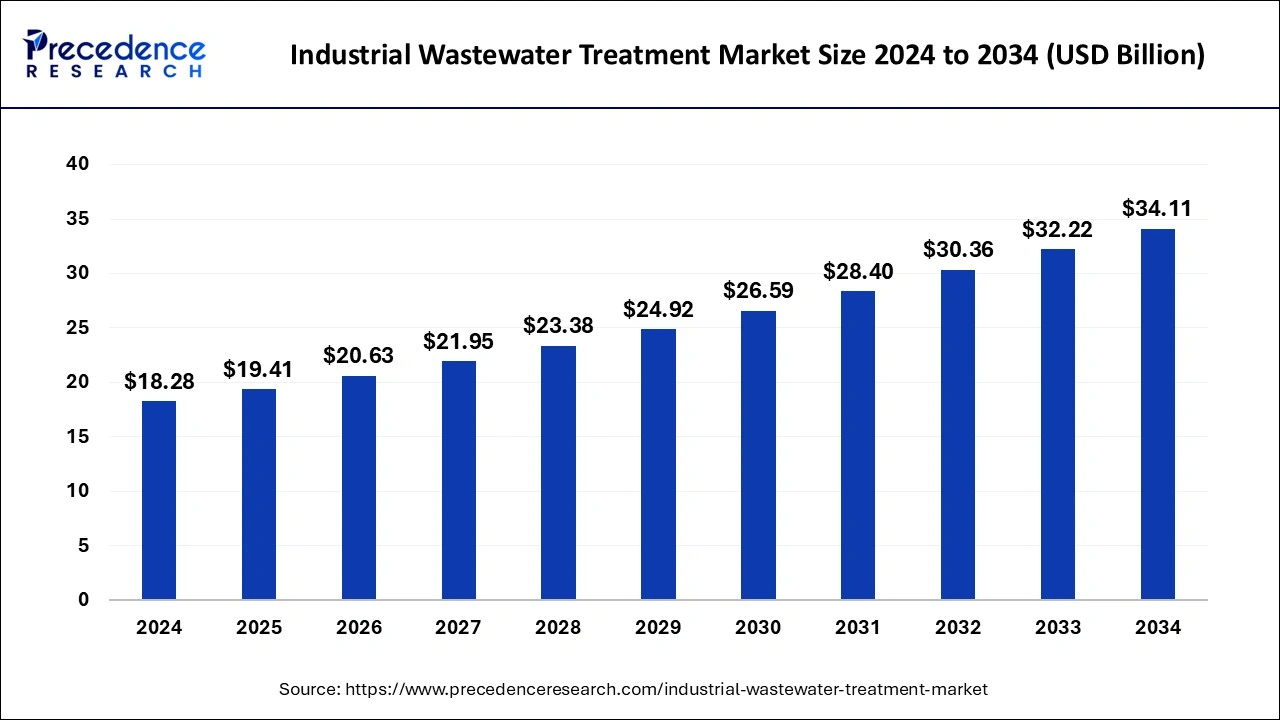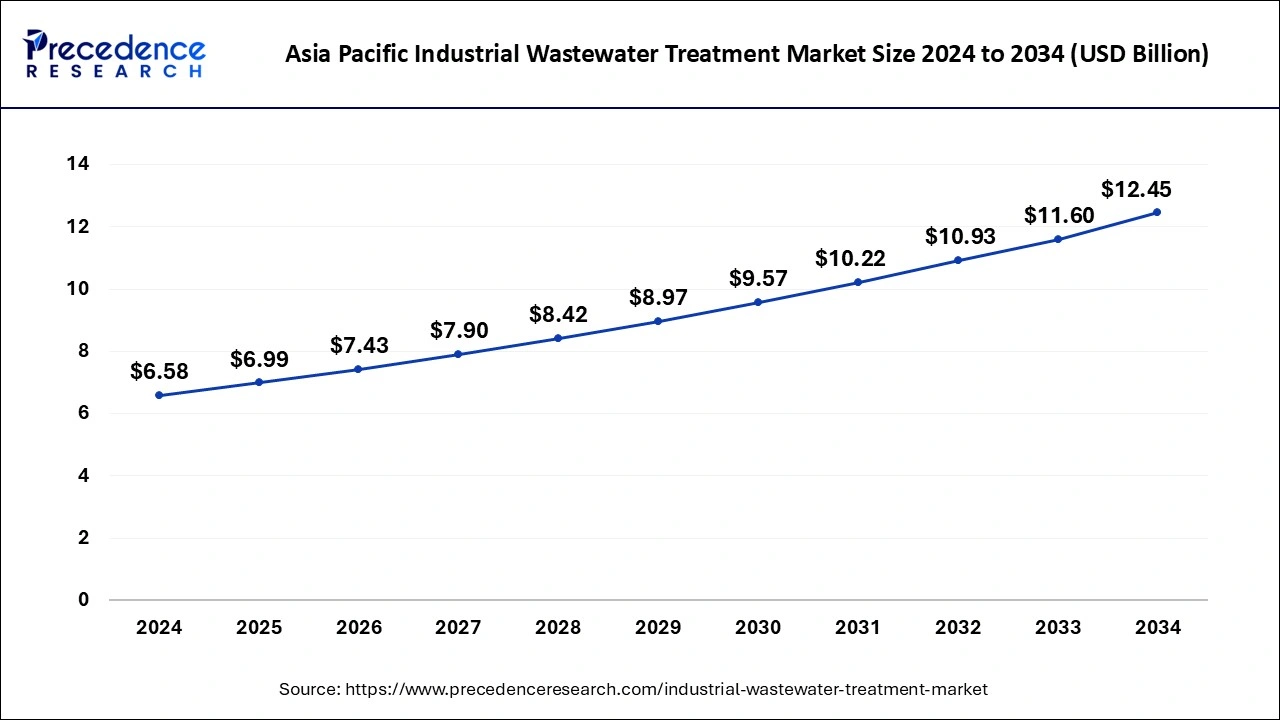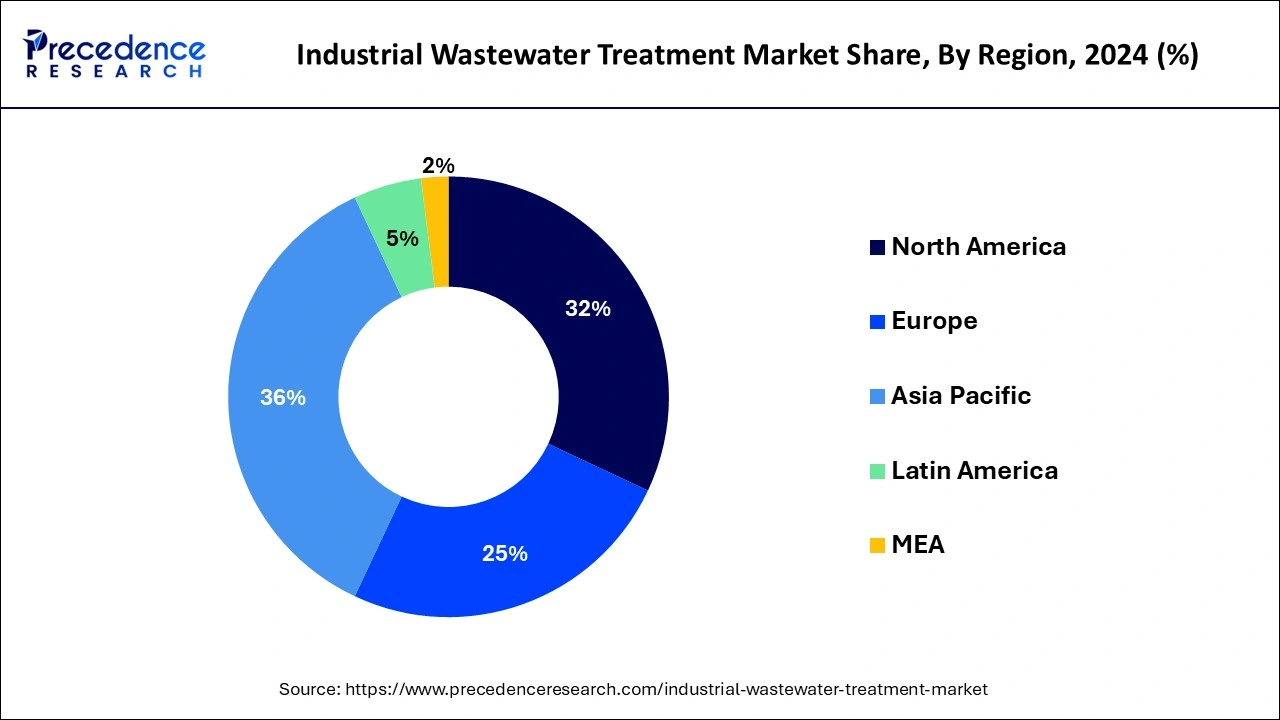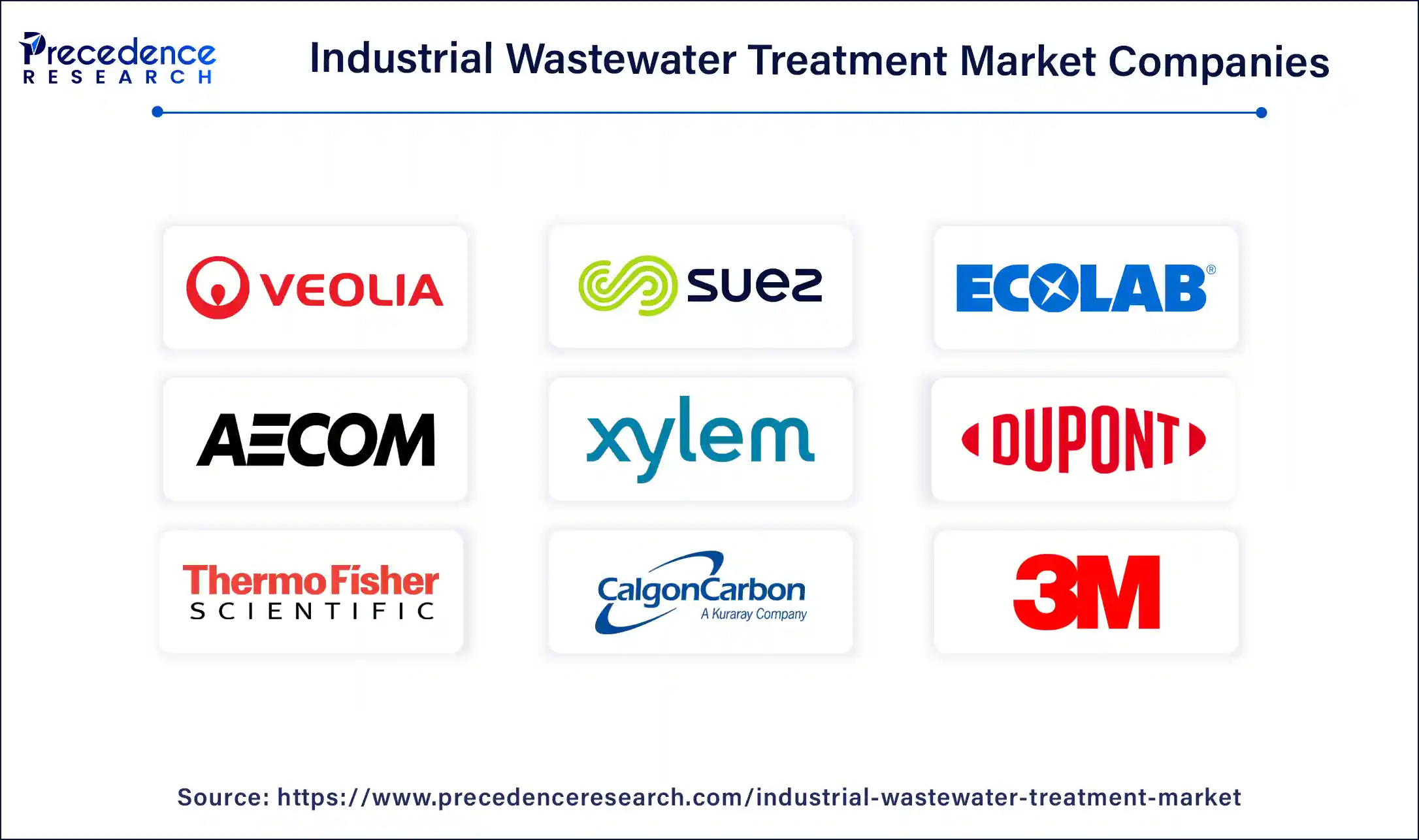January 2025
The global industrial wastewater treatment market size is estimated at USD 19.41 billion in 2025 and is predicted to reach around USD 34.11 billion by 2034, accelerating at a CAGR of 6.44% from 2025 to 2034. The Asia Pacific industrial wastewater treatment market size surpassed USD 6.99 billion in 2025 and is expanding at a CAGR of 6.58% during the forecast period. The market sizing and forecasts are revenue-based (USD Million/Billion), with 2024 as the base year.
The global industrial wastewater treatment market size was exhibited at USD 18.28 billion in 2024 and is projected to be worth around USD 34.11 billion by 2034, poised to grow a CAGR of 6.44% during the forecast period from 2025 to 2034. The market growth is attributed to the increasing need for sustainable wastewater management solutions driven by industrial expansion and stringent environmental regulations.

AI increases the productivity and quality of the processes in industrial wastewater treatment and the facility’s decision-making process. Machine learning processes monitor data in real-time to estimate system capabilities, identify inefficiencies, and suggest remedial solutions. Operating costs are therefore kept low, and pollution levels are low. Modern algorithms in machine learning water quality indicators such as pH value, turbidity, and chemical content are kept undamaged at the highest possible level corresponding to the most rigorous requirements. Smart technologies in equipment management diagnose likely failures before they occur and, therefore, reduce the loss of time, improving the reliability of plants in general.
The Asia Pacific industrial wastewater treatment market size was valued at USD 6.58 billion in 2024 and is expected to reach USD 12.45 billion by 2034, growing at a CAGR of 6.58% from 2025 to 2034.

Asia-Pacific has held the largest market share of 36% in 2024. The region is witnessing robust growth in the industrial wastewater treatment market, propelled by rapid industrialization and stringent environmental regulations. Increasing investments in advanced treatment technologies, such as membrane filtration and biological treatment, reflect the region's commitment to sustainable practices. The market experiences a shift towards decentralized treatment solutions, addressing diverse industrial needs and fostering innovation in response to the escalating demand for efficient and eco-friendly wastewater management.
Europe is estimated to observe the fastest expansion. In Europe, the industrial wastewater treatment market is characterized by a strong emphasis on circular economy principles and green initiatives. Stringent regulatory frameworks drive continuous advancements in treatment technologies, with a notable focus on resource recovery. Decentralized treatment solutions gain traction, aligning with the region's commitment to localized and efficient wastewater management. Collaborative public-private partnerships and a growing awareness of water scarcity underscore Europe's leadership in adopting environmentally responsible industrial wastewater treatment practices.

In North America, the industrial wastewater treatment market exhibits dynamic trends marked by a concerted effort to enhance sustainability in industrial practices. Stringent environmental regulations drive investments in advanced treatment technologies. The region emphasizes decentralized treatment solutions, promoting localized and efficient wastewater management. Collaborative initiatives and technological innovations underscore North America's commitment to addressing industrial wastewater challenges while adhering to stringent environmental standards.
The industrial wastewater treatment market focuses on the purification and treatment of wastewater generated by industrial processes before discharge into the environment. Driven by environmental regulations and corporate sustainability initiatives, the market employs various technologies to remove pollutants and contaminants from industrial effluents. Key components include physical, chemical, and biological treatment methods. The market addresses diverse industrial sectors such as manufacturing, chemicals, pharmaceuticals, and energy.
Ongoing advancements in treatment technologies, coupled with a rising awareness of water scarcity, underscore the market's importance in promoting responsible industrial practices and minimizing the environmental impact of industrial wastewater discharge. As the industrial wastewater treatment market evolves, there's a growing emphasis on sustainable practices, the reuse of treated water, and the integration of innovative technologies, reflecting a commitment to environmental stewardship and resource conservation.
| Report Coverage | Details |
| Growth Rate from 2025 to 2034 | CAGR of 6.44% |
| Market Size in 2025 | USD 19.41 Billion |
| Market Size by 2034 | USD 34.11 Billion |
| Largest Market | Asia Pacific |
| Base Year | 2024 |
| Forecast Period | 2025 to 2034 |
| Segments Covered | By Type, By Application, By Technology, and By End Use Industry |
| Regions Covered | North America, Europe, Asia-Pacific, Latin America, and Middle East & Africa |
Water scarcity concerns and technological advancements
Water scarcity concerns and technological advancements synergistically drive the surge in market demand for industrial wastewater treatment. Heightened awareness of water scarcity positions efficient wastewater treatment as a pivotal strategy for responsible water management. Industries, recognizing the imperative to minimize their water footprint, increasingly invest in advanced treatment solutions to address this critical resource challenge.
Simultaneously, technological advancements propel the market forward by offering innovative and more effective wastewater treatment options. Cutting-edge technologies such as membrane filtration, advanced oxidation processes, and intelligent monitoring systems enhance treatment efficiency, enabling industries to meet stringent environmental standards. The convergence of water scarcity concerns and technological progress creates a compelling narrative, fostering a robust market demand as businesses strive to not only comply with regulations but also adopt sustainable practices in water usage and discharge, ensuring the long-term viability of water resources.
Operational and maintenance expenses and energy consumption
Operational and maintenance expenses, coupled with high energy consumption, act as significant restraints on industrial wastewater treatment. The deployment and upkeep of advanced treatment technologies involves substantial operational costs, including skilled personnel, equipment maintenance, and compliance monitoring. This financial burden can deter some industries, particularly smaller enterprises, from adopting sophisticated wastewater treatment solutions, limiting market expansion.
Moreover, the energy-intensive nature of certain treatment processes contributes to increased operational costs and carbon footprints. Industries must grapple with the challenge of balancing effective wastewater treatment with the associated energy consumption. As sustainability becomes a focal point for businesses, finding cost-effective and energy-efficient solutions becomes imperative to alleviate the financial strain on industries and encourage broader adoption of environmentally responsible industrial wastewater treatment practices.
Development of smart wastewater treatment technologies and decentralized treatment solutions
The surge in market demand for industrial wastewater treatment is notably fueled by the development of smart wastewater treatment technologies. Integrating digital and smart solutions enhances the efficiency and monitoring capabilities of wastewater treatment processes. Advanced sensor networks, real-time data analytics, and automation optimize treatment operations, enabling industries to meet environmental standards with precision and effectiveness. This technological evolution aligns with the industry's commitment to innovation, sustainability, and regulatory compliance.
Furthermore, the adoption of decentralized treatment solutions contributes significantly to the market's growth. The industrial sector is increasingly acknowledging the advantages of on-site wastewater treatment, diminishing the reliance on centralized facilities and mitigating the environmental impact linked to transportation. Decentralized systems provide a flexible, cost-effective solution, adept at addressing unique local challenges. This trend stands out as a pivotal driver, adeptly meeting the diverse and evolving requirements of industrial wastewater treatment while aligning with sustainability goals and optimizing resource utilization.
By type, the corrosion inhibitors segment registered its dominance over the global market. Corrosion inhibitors are chemical compounds added to wastewater treatment processes to mitigate the corrosive effects of contaminants. In the industrial wastewater treatment market, corrosion inhibitors play a crucial role in preserving equipment integrity. Trends indicate a growing preference for environmentally friendly inhibitors, aligning with sustainable practices. Ongoing research focuses on enhancing inhibitor effectiveness, especially in harsh industrial environments, while minimizing the ecological impact.
By type, the scale inhibitors segment is predicted to witness significant growth in the market over the forecast period. Scale inhibitors prevent the formation of scale, a mineral deposit, in industrial wastewater systems. In the market, trends reflect a shift towards advanced scale inhibitors that offer improved efficiency and are compatible with diverse industrial processes. The demand for scale inhibitors is rising, driven by their ability to optimize equipment performance and reduce maintenance costs. Additionally, trends showcase a focus on tailored inhibitor solutions to address specific scaling challenges in various industrial settings.
By application, the boiler feed water segment is predicted to witness significant growth in the market over the forecast period. Boiler feed water treatment in industrial wastewater treatment involves purifying water to meet stringent quality standards for use in boilers. The process removes impurities and contaminants to prevent scale formation, corrosion, and fouling. Trends in this application include a shift toward advanced membrane technologies, such as reverse osmosis, and the integration of digital monitoring for precise control, ensuring optimal boiler performance and longevity.
The chemical production segment is projected to grow at the fastest rate over the projected period. Chemical production wastewater treatment addresses the complex effluents generated in chemical manufacturing. Trends in this application focus on sustainable practices, with an emphasis on resource recovery and the adoption of advanced oxidation processes. Industry is witnessing a move towards closed-loop systems, minimizing water usage and enhancing overall efficiency in treating wastewater from chemical production processes.
By technology, the biological treatment segment registered its dominance over the global market. Biological treatment in the industrial wastewater treatment involves the use of microorganisms to break down pollutants in wastewater. Employing bacteria and other biological entities, this eco-friendly process transforms contaminants into harmless by-products. Recent trends showcase an increasing adoption of advanced biological treatment techniques, optimizing microbial activity through bioaugmentation and biofilm technologies.
The membrane bioreactor segment is projected to grow at the fastest rate over the projected period. A Membrane Bioreactor (MBR) combines biological treatment with membrane filtration, offering a compact and efficient solution for wastewater treatment. MBR technology utilizes membranes to separate solids, producing high-quality treated water. Trends in the industrial wastewater treatment market indicate a rising preference for MBR systems due to their small footprint, superior effluent quality, and adaptability to various industrial applications. This underscores a shift towards advanced technologies that prioritize both environmental sustainability and process optimization.
By the end-use industry, the oil and gas segment has led the global market. In the oil & gas sector, the industrial wastewater treatment addresses the complex challenge of managing wastewater from extraction, refining, and processing operations. Trends include the adoption of advanced treatment technologies for oil removal, compliance with stringent environmental regulations, and a growing focus on water reuse. Sustainable solutions are pivotal as the industry navigates water-intensive processes, enhancing treatment efficiency and minimizing environmental impact.
The food & beverage segment is anticipated to expand at the fastest rate over the projected period. In the food & beverage sector, the industrial wastewater treatment market focuses on treating effluents from food processing, packaging, and beverage production. Trends involve innovative biological treatment methods, water conservation initiatives, and compliance with food safety standards. Growing awareness of sustainability drives the adoption of resource recovery practices, such as capturing and reusing by-products, emphasizing the industry's commitment to responsible wastewater management.

By Type
By Application
By Technology
By End Use Industry
By Geography
For inquiries regarding discounts, bulk purchases, or customization requests, please contact us at sales@precedenceresearch.com
No cookie-cutter, only authentic analysis – take the 1st step to become a Precedence Research client
January 2025
January 2025
September 2024
October 2024